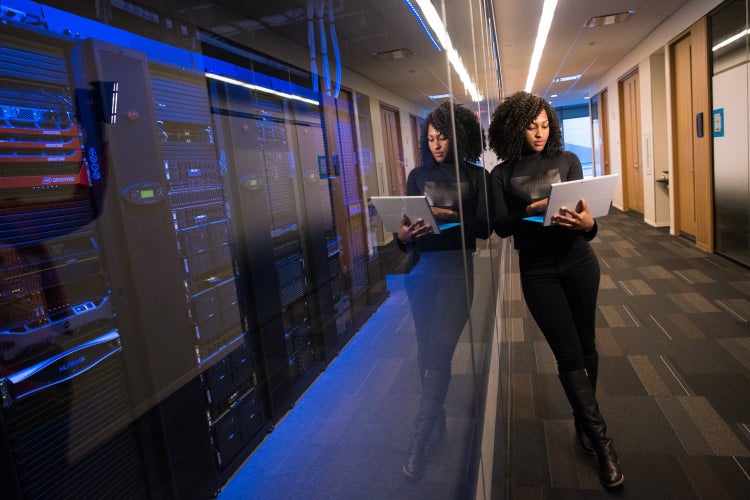Women in Cyber Security: 7 Reasons to Enter the Field

Did you know that in 2019 women in cyber security roles only made up 24% of cyber security professionals? Women are underrepresented in science, technology, engineering and mathematics (STEM) fields in general. The National Girls Collaborative Project found 28% of STEM positions were held by women in 2018. These facts demonstrate the massive amount of opportunity women currently enjoy in the cyber security field.
Women interested in STEM careers can help fill a global skill gap after graduation. (ISC)² found that employers around the world need at least 4 million cyber security professionals to meet their needs. These shortages include a need for 561,000 professionals in North America and 2.6 million in the Asia-Pacific region.

 This insufficient supply of skilled workers is of great concern to the economic security of businesses around the world. Without skilled practitioners, public and private organizations leave themselves exposed to costly hacks. The gender gaps in cyber security and STEM fields need to be bridged to fill vital positions.
This insufficient supply of skilled workers is of great concern to the economic security of businesses around the world. Without skilled practitioners, public and private organizations leave themselves exposed to costly hacks. The gender gaps in cyber security and STEM fields need to be bridged to fill vital positions.
Dr. Mahsa Mohaghegh is the Director of Women in Technology at the Auckland University of Technology. She started the STEM networking organization SheSharp to encourage women to enter these fields. Mohaghegh describes in the video below how women can work through age-old perceptions and lack of mentors to find STEM jobs:
You can follow Dr. Mohaghegh’s advice by pursuing your interest in STEM fields through graduate studies. A graduate degree in cyber security places you in a position to move quickly into a leadership role. We’ve identified seven clear reasons why women should enter the cyber security field.
Opportunities and Job Security for Women in Cyber Security
Computer hacking has not always been associated with malicious actors. In 1969, students at the Massachusetts Institute of Technology (MIT) hacked early software programs to improve performance. These white-hat hackers would soon be joined by black-hat hackers looking for money, fame or to cause chaos.
In the 21st century, notable hacking incidents have brought the importance of cyber security into stark relief. The largest data breaches in recent history include:
- A 2013 hack of Yahoo! exposing 3 billion user records
- A 2019 security lapse at First American Financial opening 885 million records to hackers
- A 2019 data breach at Facebook that impacted records for 540 million users

An Exponential Explosion of Data
The World Economic Forum estimates that 463 exabytes — or 463,000,000,000,000,000,000 bytes — will be created daily by 2025. Individuals need to know that their growing data needs aren’t exposing them to bad actors. Companies need cyber security experts to protect against costly attacks.
Growing data streams and the urgent need for experts create a great market for cyber security professionals. The Bureau of Labor Statistics (BLS) estimates a 32% growth in information security jobs from 2018 to 2028. By 2028, there will no doubt be cyber security career paths that did not exist in 2018.
We don’t have to wait until 2028 to see the need for women in cyber security. Cybersecurity Venture estimated 3.5 million cyber security job openings by December 2021. The organization also concluded that cybercrime will cost companies $6 trillion by 2021.

Opportunities for Skilled Workers
Given that the supply of skilled workers in the field is estimated to fall far short of expected demand, the opportunity for graduates is strong. Burning Glass Technologies published a report on cyber security hiring that makes these opportunities clear. The cyber security landscape is informed by the following trends:
- Available cyber security jobs grew 94% from 2013 to 2017 compared to 30% for all IT jobs
- Employers found 2.3 qualified applicants per cyber security role in 2017 compared to 5.8 per job across all industries
- More than 50% of work is done as part of an employee’s portfolio rather than their sole focus
Women in cyber security find career challenges and long-term security. Given staff shortages, you will have multiple job opportunities available at various stages in your career.

Rewarding Career with High Pay for Women in Cyber Security
Considering the economies of scale, high demand jobs and low supply of qualified talent, pursuing a career in cyber security for women is very promising. Salaries among the cyber security job marketplace are competitive in the marketplace, with compensation levels typically starting near six figures.
Forbes reports that entry-level pay is about $10,000 better than the national median salary and executive positions can reach into the $500,000 range. Based on data from the U.S Bureau of Labor Statistics, below are some of the top cyber security roles with the highest pay:
- Computer and Information Systems Manager: $142,530 per year
- Computer Network Architects: $109,020 per year
- Information Security Analyst: $98,350 per year
Depending upon the type of cyber security role, the level of specialization and other factors such as years of experience, location and education level, salaries can vary. Related job titles include Chief Information Officer, Information Risk Manager, Security Engineer and Security Director.
There are also various career concentrations that you can delve into according to current issues in cyber security, your interests and career goals. Women in cyber security can show their skills and improve salaries with certifications. A graduate degree in cyber security improves chances at earning certifications like:
- EC-Council’s Certified Ethical Hacker (C|EH)
- EC-Council’s Certified Network Defender (C|ND)
- Cisco’s Certified Network Associate (CCNA)

Scholarships and Incentives To Get You Started
An abundance of scholarships and incentives are available for prospective cyber security students and several of them are exclusively for women. They are designed to equip, encourage and promote aspiring women to further their education and become security leaders within the field.
These opportunities are perfect for creating a path toward cyber security for women and positioning themselves for success. A few that are available to postgraduate students and exclusively for women are listed below:
- (ISC)² Women in Information Security Scholarship
The Centre for Cyber Safety and Education encourages women to enter the field of cyber security by awarding up to ten scholarships between $1,000 and $6,000 each.
- KnowBe4 Women in Cybersecurity Scholarship
KnowBe4 Women, an IT security organization, awards a $10,000 scholarship toward tuition, fees and books with an opportunity for a three-month paid internship.
- Morphisec's Women in Cybersecurity Scholarships
Scholarship opportunities are available for female students who are pursuing degrees in Cyber Security, Information Assurance, Information Security and Information Systems Security Applicants.
Qualifying for these scholarships and other funding sources lowers barriers to entry in the cyber security field. A competitive scholarship also shows employers your potential for greatness.

Women in Cyber Security Drive Innovation
Underrepresentation and the lack of diversity is a prominent issue in this male-dominated industry. Increasingly, companies are seeking to add more women to their workforce not only to balance out their talent pool but also to foster new innovative perspectives and solutions for ongoing challenges.
Organizations must diversify their workforce to become more inclusive and drive a culture of innovation, pulling from varied experiences, to tackle the growing threats to networks. Women in cyber security find enormous opportunities to guide the future of technology.
McKinsey & Co. studied the impacts of gender and racial diversity on corporate performance. The report showed how women in cyber security can impact bottom lines with the following conclusion:
“Companies in the top quartile for gender diversity are 15 percent more likely to have financial returns above their respective national industry medians.”
Over the past decade, business research has confirmed the financial value of gender and racial diversity in the tech industry. Dalberg and Intel analyzed diversity and tech, finding that:
- A workforce reflective of racial diversity could generate an additional $370 billion in revenue per year
- Tech leadership reflective of the world’s gender balance could produce $530 billion in additional revenue per year
Your pursuit of a cyber security career has a tangible impact on the global economy. Specialized skills bring value to your employer that didn’t previously exist. Women in cyber security see positive impacts to their work unavailable in other fields.

Break Barriers and Pave the Way for Women in Cyber Security
You will be able to inspire and motivate other women to enter the cyber security field by pursuing your ambitions. Given the field’s gender disparities, women in cyber security are trailblazers for the next generation of leaders. The concept of strength in numbers applies to cyber security with experienced women breaking barriers for young professionals.
We can look to leading women in cyber security to see how your career can impact others. Mogul founder Tiffany Pham offered advice to her younger self that should motivate newcomers to the field:
“When I look back to my younger self, I would tell myself to be confident first and foremost, to believe in myself, before anyone else because if I believe in myself, then others will too. And ultimately, this confidence and belief in myself would enable me to enable other women around the world. It’s about believing in your goals and what you are passionate about, and from that, others will become passionate about it too.”
Bank of America Vice President Kim Vu pointed to the uniqueness of women in cyber security due to gender gaps. Vu turned this reality into motivation:
“By having the courage to take the first step into rooms, circles and conversations where you may feel like you don’t belong, you also open the door for others to contribute their diverse perspectives, creating more meaningful, collaborative solutions for today and beyond.”
Your work in cyber security can create impacts felt long after you’ve dodged hackers and online attacks. Women in cyber security look for mentors and success stories as they enter the field. You can be a mentor and a success story by building a successful career.

Become a Leader in the War Against Cybercrime
There are endless opportunities to make a measurable impact on the future of cyber security. IBM’s Cost of a Data Breach Report highlightshttps://www.ibm.com/security/data-breach what’s at stake for businesses and governments. In 2019, IBM found:
- The average cost of a data breach worldwide was $3.92 million
- The average cost of a data breach in the United States was $8.9 million
- The average data breach led to a loss of 25,575 records
Without cyber security leadership, a business can experience multiple data breaches due to exposed vulnerabilities. Even the largest companies cannot afford the long-term damages caused by hacks. Financial costs are joined by consequences including:
- Loss of customers due to reputational harm
- Lawsuits seeking recompense for a company’s negligence
- Putting databases and other systems back together after initial costs are paid
Women in cyber security roles can save the day by designing and implementing durable security processes. With a graduate degree in cyber security, you strengthen your chances of finding a job where you can influence new developments in the field and forge an enduring career.

Networking Opportunities for Women in Cyber Security
Associations worldwide are committed to advancing women in cyber security initiatives. These groups organize events and conferences to encourage and promote women in achieving their professional goals.
SheSharp hosts international events that encourage connections among women in cyber security. Experienced practitioners have helped newcomers at events themed on machine learning and data-driven decision making. The organization’s partnerships with Google, Uber and other tech giants show the value of a SheSharp event.
Another group that enhances professional networks in this field is Women in CyberSecurity (WyCyS). Members become a part of a unique leadership network centered on collaboration, empowerment and learning. WyCyS hosts an annual conference dedicated to bringing experts together to share their experiences with those just starting their careers.
Your cyber security career is enhanced when you network with fellow experts. A graduate degree in cyber security helps make the most of these networking opportunities.

St. Bonaventure University and Women in Cyber Security
Cyber security is a great field to consider for female STEM professionals, especially those with a computer science background or coding experience. Women with graduate degrees in cyber security, particularly, are in high demand for cybersecurity roles.
St. Bonaventure's Online Master of Science in Cybersecurity makes it easy for women in cyber security to prepare for future roles. Program features that are appealing to working professionals shifting to the cyber security field include:
- Completely online courses and assignments
- No graduate entrance exam requirements
- Advanced courses in penetration testing, enterprise security and forensics
Our cutting-edge program is purposefully designed to prepare graduates for certifications. The school’s partnerships with CISCO Academy and EC-Council inform course materials that meet the needs of major employers.
Why not take the first step by learning more about St. Bonaventure University's online Master of Science in Cybersecurity program?
Read more of SBU's top Cyber Security blogs below:
1. Cyber Security: Your Complete Guide
2. What 3 Students Said About SBU’s Online Graduate Cyber Security Experience
3. How to Become a Cyber Security Specialist
4. These 5 Experts Deliver SBU’s Renowned Cybersecurity Graduate Programs
5. 3 Ways a Master’s in Cyber Security Can Lead to a Lucrative IT Career
